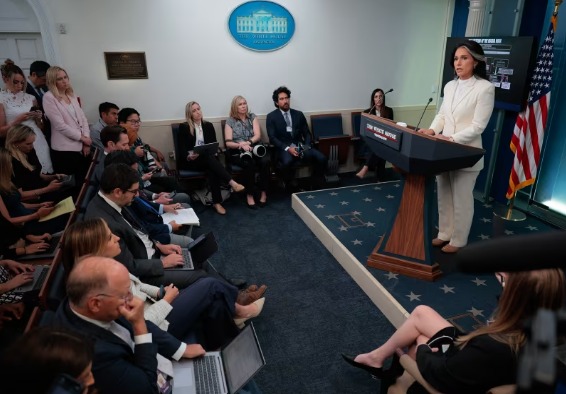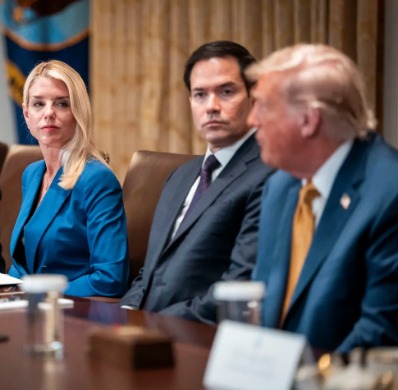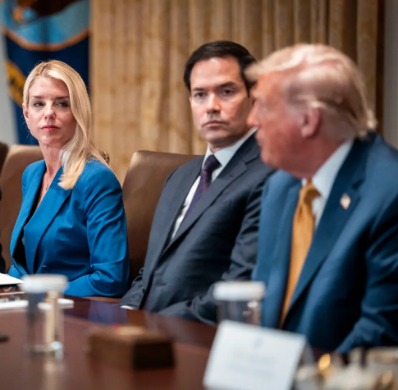White House Director of National Intelligence Tulsi Gabbard talks to reporters in the Brady Press Briefing Room at the White House on July 23 in Washington, DC.
One day after President Donald Trump accused former President Barack Obama of treason over the intelligence assessment that Russia interfered in the 2016 election and sought to help Trump, Director of National Intelligence Tulsi Gabbard declassified a highly sensitive congressional report she claimed was more evidence of a “treasonous conspiracy.”
The release of the redacted report, written during the first Trump term by Republicans on the House Intelligence Committee, was the latest step in a multi-faceted effort from Gabbard and other Trump allies to attack the FBI’s Russia investigation and the intelligence community’s assessment on Russian election interference.

Attorney General Pam Bondi announced Wednesday evening that the Justice Department was creating a strike force to assess the evidence released by Gabbard and “investigate potential next legal steps which might stem from DNI Gabbard’s disclosures.”
Speaking from the White House podium on Wednesday, Gabbard stopped short of accusing Obama of treason, deferring to Justice Department lawyers. But she alleged that “the evidence that we have found and that we have released directly point to President Obama leading the manufacturing of this intelligence assessment.”
“They knew it would promote this contrived narrative that Russia interfered in the 2016 election to help President Trump win, selling it to the American people as though it were true,” she said.
Gabbard insisted the Russian goal in 2016 was to sow distrust in American democracy — not to help Trump, a key judgment of the 2017 assessment that Republicans have long challenged.
But her claims that the Obama administration “manufactured” the assessment are not supported by the newly redacted House report — or CIA Director John Ratcliffe’s own review of the intelligence assessment, which he released earlier this month.
Ratcliffe’s review argued the assessment that Russian President Vladimir Putin “aspired” to help Trump win the 2016 election should not have been a so-called high confidence judgment, which indicates the intelligence community’s level of certainty, and it took issue with some of the analytic procedures underpinning the assessment. But Ratcliffe’s review found that “the overall assessment was deemed defensible.”
The House report — which involved intelligence so sensitive it was kept in a so-called “turducken,” or a safe within a safe, at CIA headquarters — took a similar stance on the key judgment that Russia sought to help Trump, arguing that the assessment made analytical leaps based on relatively thin sourcing and failed to weigh contradictory intelligence highly enough, but neither argued that it was “manufactured.”
Still, the release of the House Intelligence Committee review, led by former Rep. Devin Nunes when now-FBI Director Kash Patel was a top aide, was a long-sought victory for Trump — in large part because it pushes back against a similar review conducted by the GOP-led Senate Intelligence Committee in 2020, which found the intelligence supported the conclusions that Putin interfered to help Trump and there were no “significant tradecraft issues” in the preparation of the assessment.
Gabbard’s decision to publicize the report when multiple predecessors had declined to do so, including Ratcliffe during Trump’s first term, comes at a moment when her standing within the Trump administration had been in question. In June, Trump publicly undermined Gabbard’s assessment on Iran’s nuclear capabilities and she was absent from at least one major national security meeting to discuss Israel and Iran. CNN reported at the time that the president viewed her as “off-message.”
Former Obama Director of National Intelligence James Clapper dismissed Gabbard’s allegations on Wednesday, calling them “patently false and unfounded” on CNN’s ‘The Source.’
Referring to the House Republican report, he said, “I can attest to the inaccuracies in that report on things they said about me, which were wrong or false.”
‘I’d be going dark’
Democrats accused Gabbard of jeopardizing intelligence community sources and methods by releasing the report.
“The desperate and irresponsible release of the partisan House intelligence report puts at risk some of the most sensitive sources and methods our Intelligence Community uses to spy on Russia and keep Americans safe,” Sen. Mark Warner, the top Democrat on the Senate Intelligence Committee, said in a statement. “And in doing so, Director Gabbard is sending a chilling message to our allies and assets around the world: the United States can no longer be trusted to protect the intelligence you share with us.”
One Democratic congressional source said intelligence agencies were still in the process of proposing redactions to the document ahead of its release, but that Gabbard declassified the report Wednesday before the process had been completed.
An ODNI official said the decision to declassify the document was made by Trump and “he has constitutional authority to declassify and is not under the same consultation obligations” normally required between intelligence agencies.
Attorney General Alerted Trump His Name Appeared in Epstein Files
Published July 23, 2025Updated July 24, 2025, 1:27 a.m. ET
Attorney General Pam Bondi informed President Trump in the spring that his name appeared in the Jeffrey Epstein files, according to three people with knowledge of the exchange.
The disclosure came as part of a broader briefing on the re-examination of the case against Mr. Epstein, who died in 2019 while awaiting trial on sex trafficking charges, by F.B.I. agents and prosecutors. It was made by Ms. Bondi during a meeting that also included the deputy attorney general, Todd Blanche, and covered a variety of topics. Ms. Bondi frequently meets with Mr. Trump to brief him on various matters, officials said.

A House panel voted to subpoena the Justice Dept. for the Epstein files, with 3 Republicans supporting the effort.

A key House subcommittee on Wednesday voted to subpoena the Justice Department for its files regarding the investigation into the accused sex trafficker Jeffrey Epstein, after a few Republicans broke with their party to join Democrats in backing the move.
The motion for a subpoena, introduced by Representative Summer Lee of Pennsylvania, was the latest effort by Democrats to force Republicans to go on the record about whether to release the Epstein files, an issue that has divided the G.O.P. It was precisely the kind of vote that Speaker Mike Johnson had sought to avoid when he announced on Tuesday that he would cut short the final week of legislative business in the House ahead of a scheduled five-week recess.


